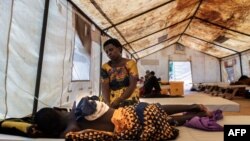The affected countries include Malawi, Mozambique, Zambia, Zimbabwe, South Africa, Burundi, Tanzania, Kenya, Somali, Ethiopia and South Sudan.
UNICEF said in a statement over 67,000 cases and an estimated 1,788 deaths have occurred in the regions, with Malawi and Mozambique bearing the heaviest burden.
The agency is appealing for $34.9 million for Malawi and $21.6 million for Mozambique to provide lifesaving services to over 5 million people affected by the outbreak.
Dr. Paul Ngwakum, UNICEF regional health adviser eastern and southern Africa, told VOA the varying factors include poor water and sanitation, drought, insecurity and extreme weather patterns, which have all exacerbated the spread of the disease.
"If go to the Horn of Africa where we are having other complications due to drought, you have Somalia, you have Kenya, you have Ethiopia, and these are complex situations because in parts of Ethiopia, you have insecurity and almost all of Somalia there is insecurity," Ngwakum said.
"If we don't intervene rapidly, we may have to come to a more serious situation," he added.
Ngwakum said in addition to water support for the areas challenged by drought, UNICEF is working through the organization’s Social and Behavior Change-Community Engagement process, which builds on COVID-19 and other outbreak responses to use innovative ways to engage communities.
South Sudan, which rounds up the list of 11, on Wednesday declared a new outbreak.
The nation’s health ministry declared the outbreak after more than 170 cases were reported in Malakal, the capital of Upper Nile State. The ministry is now urging residents to get vaccinated against cholera.
UNICEF says it will work with its partners to provide essential medical supplies and tents to manage severe cases. The organization says it will also provide lifesaving nutrition interventions, training to healthcare workers and establish community-based oral rehydration points to help prevent severe cholera cases.
"This is a serious cholera crisis – and all signs point to this getting much worse before it gets better," Lieke van de Wiel, UNICEF deputy regional director, said in a statement.
"We need urgent and sustained investment to respond to the immediate outbreaks and strengthen systems and communities to be better prepared for what is likely to be more severe occurrences in the future."
South Sudan in Focus reporter Deng Ghai Deng contributed to this report.







